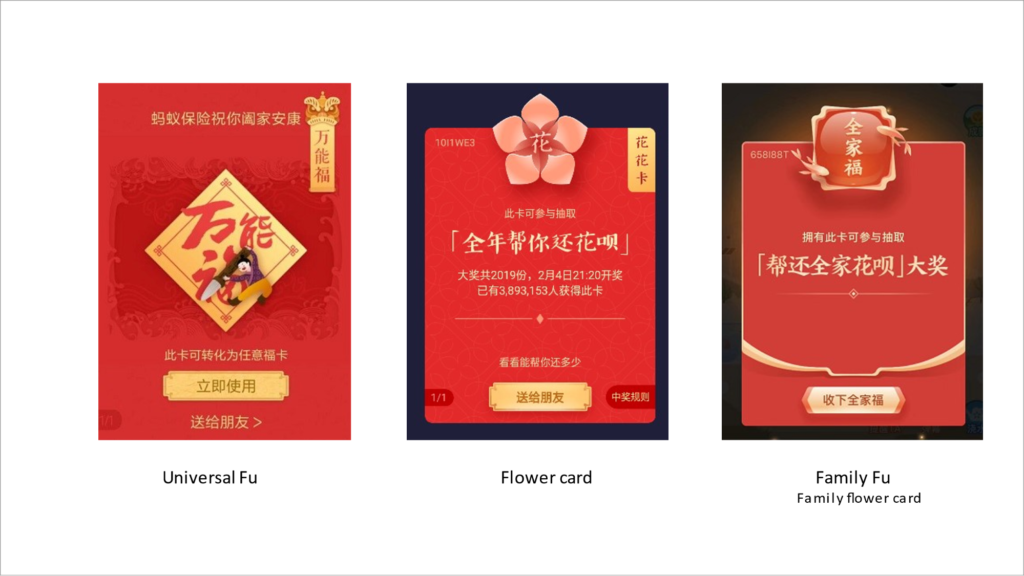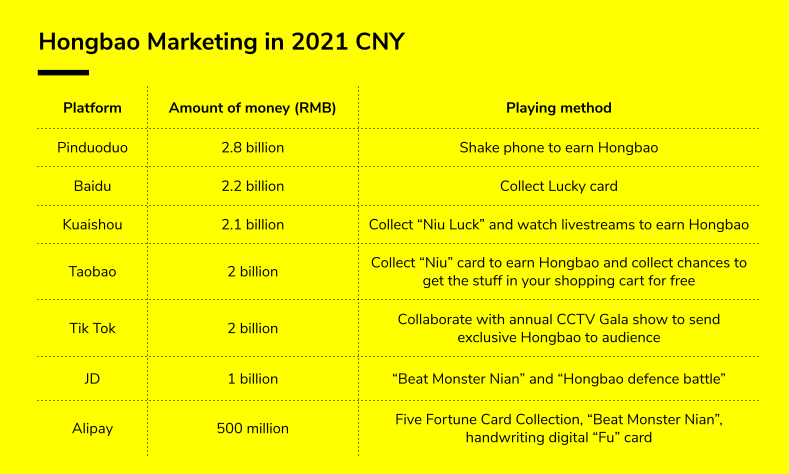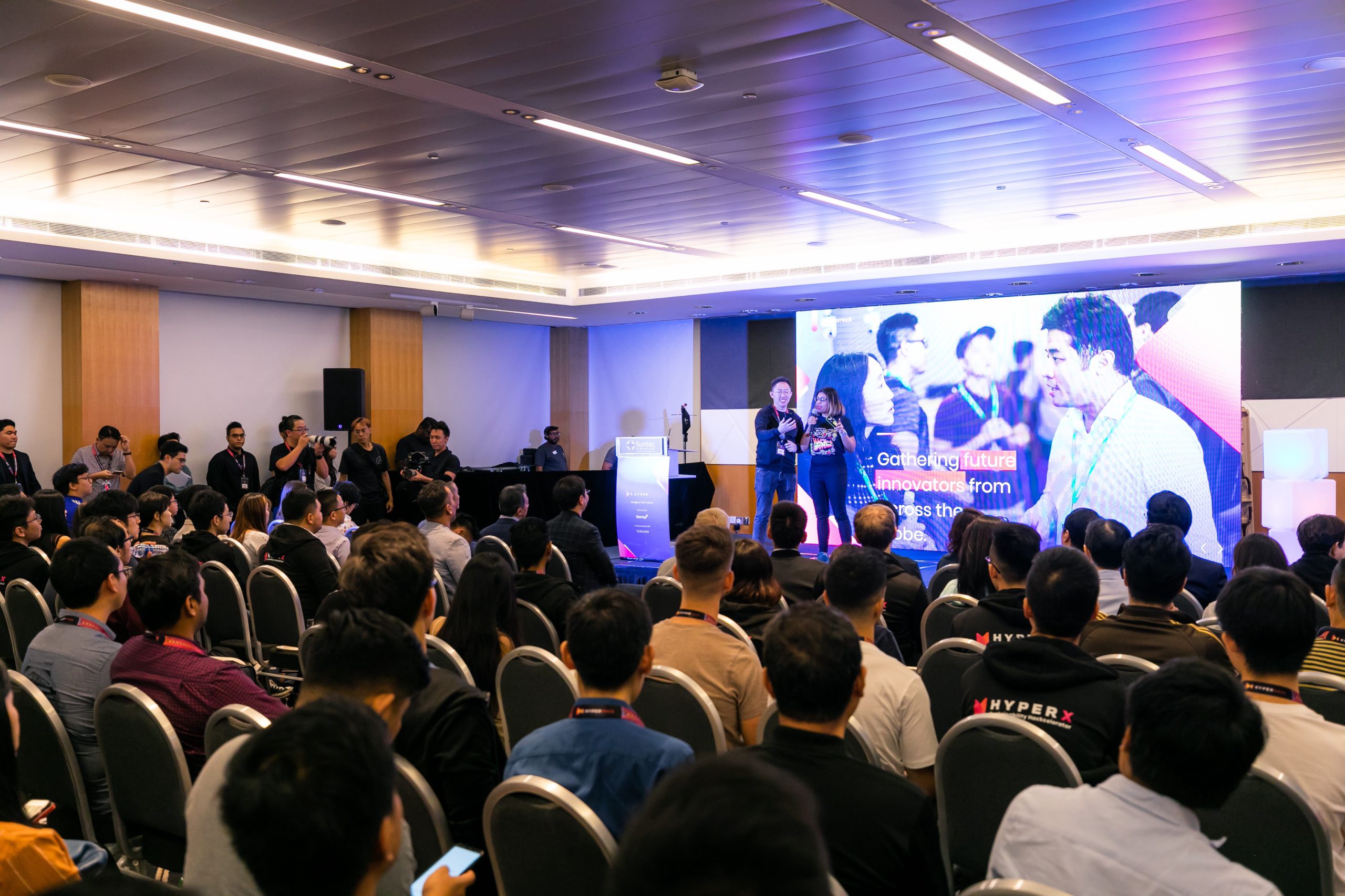The gifting of Hongbao, one of the most notable traditions in Chinese New Year (CNY), has been used in marketing for several years. In the digital age, digital Hongbao rather than physical Hongbao has increased in popularity especially amongst the younger generation, as advanced e-payment systems assure users of greater safety and security when transferring money to others. To better understand how brands leverage on CNY for marketing, it is crucial to dive deep into the digital Hongbao space.
One of the most famous Hongbao marketing campaigns in China is Alipay’s “Five Fortune Card Collection” (“集五福”). Its widespread success and yearly revival since its inception in 2016 has led to it becoming a case study of CNY marketing in China, and a highly anticipated part of the CNY festivities each year. During the campaign period, users are required to collect five kinds of “Fu” (“福”, fortune) cards through various ways, and stand a chance to win cash prizes from Alipay’s prize pool. This cash pool has increased from RMB 215 million in 2016 to RMB 500 million in 2021. While the collection of Fu cards is the key mode of consumer engagement in this campaign, new methods of engagement have been created over the years to better meet the needs of consumers. With sustained popularity and success, the “Five Fortune Card Collection” has become Alipay’s trademark advertising campaign.
Origin of the Five Fortune Card Collection
The Five Fortune Card Collection was an emerging gamification concept in 2016. The 5 Fu cards to collect are: Patriotic Fu, Prosperous Fu, Harmonious Fu, Friendly Fu, Dedicated Fu (爱国福,富强福,和谐福,友善福,敬业福). To control the number of people who would qualify to receive the rewards, the difficulty of collecting the cards varies, with Dedicated Fu being the hardest.

Figure 8: Five Fortune Collection in 2016
Expansion: A successful collaboration with Huabei
In 2018, Alipay launched a new Fu card called Universal Fu (万能福). This card could be exchanged into any of the five original Fu cards, increasing the novelty and enjoyment of the campaign. In 2019, Alipay launched another card called the Flower card through a collaboration with Huabei, a credit product offering a “buy now, pay later” function for Alipay transactions. Collecting the Flower card offers users a chance for their Huabei bills in the next year to be entirely waived off. In 2020, the Flower card was upgraded to a Family Flower card. Users are required to build a family team before participating in the lucky draw, and collectors of the Family Flower card who won the prize will enable all other family team members to also receive the prize.

Figure 9: Alipay new Fu card from 2018-2020
Extension: Enriching the gaming experience with traditions
In 2021, Alipay added a game to the campaign called “Beat the Monster Nian”, which would be activated once users complete the Five Fortune Card Collection, allowing them to earn even more Hongbao. Monster Nian is a key character in the folklore of the CNY festival, and many of the CNY traditions are based on the belief of scaring away this mythical beast to protect their loved ones. In the game, people could also use virtual firecrackers to defeat the Monster Nian, offering some sense of nostalgia as firecrackers are now banned in the majority of cities in China. This form of gamification involving key elements of CNY and Chinese tradition resonates well with users and engages them effectively.

Figure 10: Alipay “Beat the Monster Nian”
The key to Alipay’s success
Besides the use of the iconic creature Monster Nian, Alipay’s Five Fortune Card Collection include many details that fit the CNY atmosphere and themes. The ability to share Fu cards with others represents fortune sharing; the building of a family team is an interesting way to boost the concept of family gathering and reunion during CNY; AR technology enabling users to scan hand-written Fu characters to receive Fu cards reflect the advancement of technology in today’s world. In 2021, Alipay also enabled users to hand-write a digital Fu card on its platform, generating a personalised Fu card that can then be sent to others. As many people were unable to get together with their family due to the Covid-19 pandemic, this was a new and innovative way for people to bond with their family.
When the campaign was first launched, money was clearly the most important factor motivating people to participate in the card collection. However, as the Fu card collection became a social tradition every CNY, money is no longer the top factor that draws in participants. Participants get increasingly emotionally connected with the campaign, especially with the attention to details in recreating a digital CNY atmosphere.
In 2021, more than 4500 million people participated in the campaign, as compared to less than 1 million in 2016. Yet, consider the fact that the money prize pool in 2021 was just RMB 500 million while that in 2016 was RMB 215 million. This means that most participants in 2021 will only ultimately get up to 1-2 RMB. Comparing Alipay with other platforms using the same campaign (Pinduoduo: RMB 2.8 billion, Baidu: RMB 2.2billion, Kuaishou: RMB 2.1 billion), it is clear that money is no longer the main driving force of the popularity of the Alipay Fu collection in 2021.

Table 13: Hongbao Marketing in 2021 CNY
Devoting most of their resources to building a larger money prize pool, most platforms tend to overlook the elements of engagement and sharing. The lack of innovation across the board to more effectively engage users in other ways has resulted in more homogenous offerings when it comes to the digital Hongbao.
On the other hand, Alipay’s fixation on the gamification and engagement process, and on improving the user experience year after year, has boosted Alipay to the top of the digital Hongbao battle. Their deep understanding of consumer behavior, acute insights derived from consumer psychology, comprehensive knowledge about traditional Chinese culture and innovative solutions are the key factors of their success. When the festivities of CNY is over, users are not likely to remember which platform has cash prize pool of RMB 2.8 billion or RMB 2.2 billion, but they will remember that Alipay created the Fu collection and the joy and fun it brought to them during CNY.








